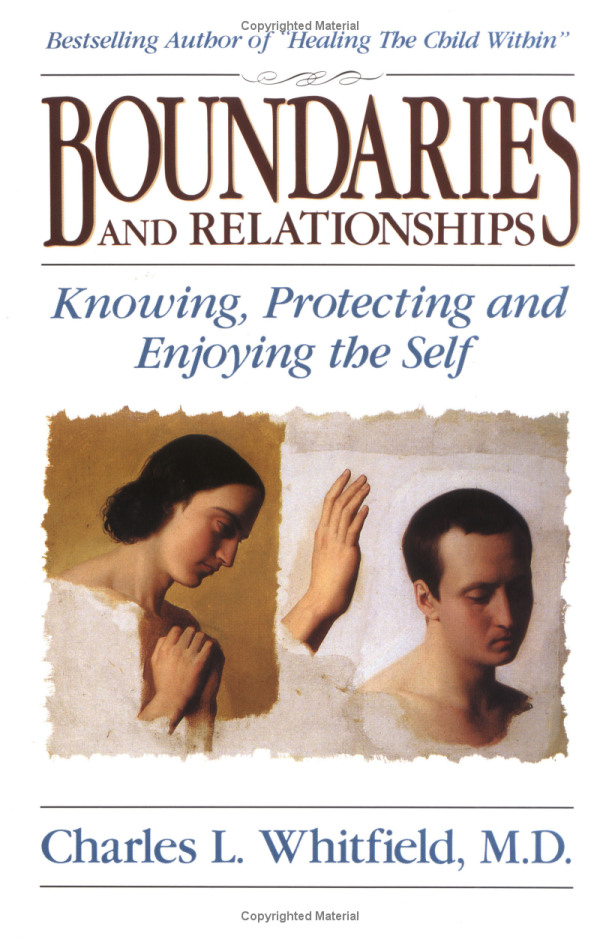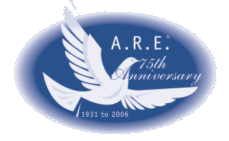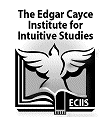| Edited by HENRY REED, Ph.D. |
August 1, 2008
|

BOUNDARIES AND RELATIONSHIPS
Knowing, Protecting and Enjoying the Self
By Charles L. Whitfield, MD
Summary by Katherine Konner
IF there’s an I, you, them and an over there too
And what you do and I do are not the same,
THEN boundaries have to exist between all of us
Because if you and I were together or in part as one, it’d be a different game.
FOR then, I would not be just I and you would not be only you
We’d be crossed, overlapping in ways.
FOR then what I do becomes part of what you do
With no if, buts or ands
SO IF you want to be the fulfillment of yourself, or you don’t want someone a part of you, in your life or on your back,
Regard, Reflect, and Protect your Boundaries!
CHAPTER 1: Overview
Dr. Whitfield theorizes that boundaries between people are a real phenomenon. Albeit, not a physical demarcation, he has drawn a map of it’s existence everywhere. He identifies a boundary as contact management, that which takes place between people, the underlining essence of the word relationship. In his book Dr. Whitfield suggests ways to identify these boundaries and how to regulate one’s ability to choose a healthy and enjoyable path.
In Chapter 1 Dr. Whitfield demonstrates the idea of a boundary through the role of a human cell. Each cell in our body has a distinct role. It knows what it is, it knows what it isn’t, and it knows what it must keep away from itself in order to survive. A cell defines its existence by separating itself from other cells. It has good contact at its semi-permeable membrane. It has the ability to let nutrients in, keep poisons out and excrete waste. A healthy cell discriminates between good and bad.
Like cells, people exhibit behaviors. A healthy person is flexible and adaptable. They use assertiveness without aggression, is expressive in a straightforward way but simultaneously sensitive to the effect such words, tone, action, etc., have upon others, is firm and respectful, tender and strong, and so on.
With the research and guidance Dr. Whitfield provides, anyone can learn how to consciously make the same healthy boundaries and relationship choices as healthy cells do. In order to act as a healthy cell, attaining what one aspires to create, boundaries and their limits (limits is defined as how far one can proceed with “comfort”) actually requires awareness of themselves first. It would seem like a Catch 22, but actually, if we just suppose that we don’t know the whole of what we actually do, then we can proceed with the notion of awareness first, change second.
1. Define yourself
2. Know that you have a self
3. Have a healthy self
It is critical to step inside yourself, to take the time to learn about your inner life. An inner life consists of beliefs, thoughts, needs, wants, intuitions, feelings, decisions, experiences, choices, sensations, and unconscious experiences. Dr. Whitfield correlates inner awareness with boundary awareness. His experience leads him to believe that the more a person directs attention on things outside themselves, the less they can be aware of their inner life, and the less they are aware of their own boundaries. Without an awareness and understanding of boundaries one becomes enmeshed in a net of whatever is out there, including the bad.
Dr. Whitfield’s sorts boundaries into 3 types: Physical, Mental/Emotional, and Spiritual. Items on the lists can be inter-related making the dimension of the boundary even more complex. He provides case histories for the reader to better understand what boundaries were broken, and therefore, where a person was mistreated or abused.
CHAPTER 2: Checking my Boundaries
Boundaries function to protect the well-being and integrity of your True Self. Chapter 2 contains a survey on personal boundaries and limits. Each question is answered on a scale system, Never – Seldom – Occasionally – Often - Usually. Afterwards, each tissue is addressed by number and Dr. Whitfield provides a synopsis of the dynamics involved, for what he calls “boundary distortion, problem or issue”.
1. I can’t make up my mind. Dr. Whitfield suggests your sacred inner life has been invaded, a result of loose boundaries. The True Self does not have the proper protection and hence, cannot differentiate which experience is another’s or one’s own.
2. I have difficulty saying “no” to people. One is already in a perplexed state of thinking they need to please another before being true to their self, often a result of prior pain.
3. I feel as if my happiness depends on other people. Acknowledgement of separateness (independence) and the need to fulfill one’s own destiny (ringing true to one’s inner self). Otherwise, dependency, loss of power, and living in response to another’s moods.
4. It’s hard for me to look a person in the eyes. If you can’t, something you are doing is not in synch with the makeup of your true self. Your body cannot tell a lie, and therefore shows it’s shame, it’s lack of integrity by looking away, according to Dr. Whitfield.
5. I find myself getting involved with people who end up hurting me. What level of awareness do you have of your True Self and sacred inner life? Are you able to discern appropriate from inappropriate behavior and detect who may be hurting you?
6. I trust others. An answer of Never to Occasionally is indicative of not being able to trust the inner life of your True Self. If one answers often or usually, over-trusting is an issue.
7. I would rather attend to others than attend to myself. Neglecting your own needs and wants (low self-esteem) causes the Child Within to hide, which in turn prevents experience from being fully actualized, and without, growth is like a plateau. It is a cycle of loss of power and experience.
8. Others’ opinions are more important than mine. Dr. Whitfield aligns with the belief that a relationship exists between what is going on around us and what is going on in our inner life. Authentic opinions are generated from the ability to observe such dynamics. Otherwise, one is led to believe and say what another thinks. Dr. Whitfield believes it is necessary to have recognition and support of the True Self, which, ironically, comes from others.
9. People take or use my things without asking me. A sense of self includes all that we have close relations to. There are understandings, agreements, contracts, and owning places and things. We make attachments to these things because we feel they are a part of us. In this way we are territorial and can tell and/or feel when another has crossed our lines. Boundaries can be too loose or another’s boundaries may be distorted (crossing into your territory on purpose or otherwise).
10. I have difficulty asking for what I want or what I need. How are you responsible for making sure that your inner life wants and needs are met? Boundary problems exist with answers of Often, Usually and Never.
11. I lend people money and don’t seem to get it back on time. How clear was your agreement? Have you chosen an unreliable person to lend money to? Boundary problems exist for those who answer often or occasionally.
12. Some people I lend money to don’t every pay me back. Same as above, including an answer of usually.
13. I feel ashamed. Shame is a result of someone invading your boundary, violating your integrity, convincing you that you are either bad, inadequate or not good enough. Dr. Whitfield believes it is impossible to be bad because something that is part of God can’t be bad.
14. I would rather go along with another person or other people than express what I’d really like to do. Boundaries that are too loose (Occasionally to Usually); boundaries that are too rigid (Never or Seldom).
15. I feel bad for being so “different” from other people. A response of Seldom or Never either indicates lack of awareness of the power inherent in the uniqueness or sameness we experience of ourselves from another, or it means that a healthy boundary has been established.
16. I feel anxious, scared or afraid. Dr. Whitfield believes that nearly every time fear is felt, it has been created by our own selves. It can be a manifestation of our false self running our life at that moment (our negative, co-dependent ego enjoying the thrill off our body chemistry of fear). His protocol is that once we feel the fear, identify whether it has any usefulness at that moment.
17. I spend my time and energy helping others so much that I neglect my own wants and needs. Our True Self suffers the consequences of any neglect we impose upon it, including susceptibility to the invasion of its boundaries by other people, places and things. Answers of Often, Usually or Never indicate a boundary problem.
18. It’s hard for me to know that I believe and what I think. There are some situations in which confusion is healthy and appropriate. However, responses of Often, Usually, or Never indicates a boundary problem.
19. I feel as if my happiness depends on circumstances outside me. Dr. Whitfield believes that happiness emanates from living from and who you really are (True Self) and connecting that in a healthy way to your Higher Power and safe others. It is the false self which longs for the momentary smidgen of happiness by experiencing things outside itself. Often and Usually answers indicate boundary problems
20. I feel good. Do you feel good in a lasting way? Never, Seldom or Occasionally indicates a boundary problem.
21. I have a hard time knowing what I really feel. True self = knowing “real” feelings. Protect the true self, know the real feelings. Answers of Often or Usually indicate a boundary problem.
22. I find myself getting involved with people who end up being bad for me. Repeated involvement with those who are not good for you indicates a lack of awareness of and being able to use personal boundaries and limits.
23. It’s hard for me to make decisions. Knowing what is going on in your inner life is the key for making decisions.
24. I get angry. One usefulness of getting angry is the energy and motivation it releases. It provides the time and space to set healthy boundaries and limits.
25. I don’t get to spend much time alone. Time with ourselves alone, with safe others, or with our Higher Power are the relationships you need to establish to allow your True Self a healthy and fulfilled life or time to heal.
26. I tend to take on the moods of people close to me. Do you feel responsible for another’s feelings or that you need to fix them? A response of Often or Usually indicates a boundary problem.
27. I have a hard time keeping a confidence or a healthy secret. A toxic secret is that which causes harm to you or another person. Do you ever ask “whose business is it to know this information?”
28. I am overly sensitive to criticism. Dr. Whitfield believes that once you live from and as your True Self and connect to your Higher Power, an awareness and confidence emerges that you are perfectly fine the way you are. Criticism does not hurt, but fear and shame are feelings which paralyze peace, joy and creativity. “Seldom” is the only answer that would reflect a healthy boundary.
29. I feel hurt. Do you feel emotional pain or hurt easily? How often do you find yourself repeating painful messages? Often and Usually answers indicate a boundary problem. Never feeling hurt can indicate a boundary that is too rigid.
30. I tend to stay in relationships that are hurting me. If we take the view that all that we are involved in and their issues contains a reflection of ourselves, then a painful relationship can be the manifestation of unfinished business from the past. To break the cycle, healthy boundaries and limits need to be established. Opportunities are always presenting themselves, sometimes as the opposite or shadow form of energy.
31. I feel an emptiness, as if something is missing in my life. Dr. Whitfield believes that when the Child Within goes into hiding emptiness becomes the feeling to try to awaken you to your own needs. With protection, the safe Child Within will “explore, experience, connect, create, celebrate and be. It feels alive and fulfilled.”
32. I tend to get caught up “in the middle” of other people’s problems. Issues associated with the above include: “control, over-responsibility for others, feelings, all-or-none thinking and behaving, fear of abandonment, low self-esteem and shame, high tolerance for inappropriate behavior, difficulty being real or authentic, and filling emptiness with another’s problems”.
33. When someone I’m with acts up in public, I tend to feel embarrassed. How can you tell if your boundaries are too loose? Behavior associated with boundaries that are too loose related to this issue include, “difficulty being real, feelings, low self-esteem, shame and over-responsibility for others, becoming embarrassed when another acts a certain way”.
34. I feel sad. On what occasions do you feel sad? Do you become sad without a clear reason? Grief without a healthy release remains ungrieved and will try to release itself whenever it can (chronic sadness). Healthy boundaries allow for feelings to be relinquished in real time, with real feelings, and allow grief it’s rightful place.
35. It’s not easy for me to really know in my heart about my relationship with a Higher Power or God. The one time it is of utmost importance to allow your boundaries to loosen is in order to allow the love, wisdom and healing to enter your True Self. According to Dr. Whitfield, established healthy boundaries enable the Child Within, the True Self, your heart, to know protection and feel protected and safe, and will openheartedly (so to speak) connect to your Higher Power.
36. I tend to rely on what others say about what I should believe and do about religious or spiritual matters. Dr. Whitfield proclaims that the “only way we can have an authentic religious or spiritual experience is from a felt sense in our own heart and soul.” How well are you able to trust yourself?
37. I tend to take on or feel what others are feeling.
38. I put more into relationships than I get out of them. Interest, energy and time can be shared in a mutual way, equally. Giving too much to another is a display of weak boundaries. Strength comes from within, not from trying to make someone want you more, or requiring things from another they do not think of themselves.
39. I feel responsible for other people’s feelings. Issues pertaining to, “over-responsibility for others, bonding vs. bondage, healthy boundaries and limits vs. enmeshment, and compassion vs. passion”.
40. My friends or acquaintances have a hard time keeping secrets or confidences which I tell them. Occasionaly, Often and Usually indicate a boundary problem.
|
|




